Iranian Insurance Retailer Suspended Over Hijab Violation
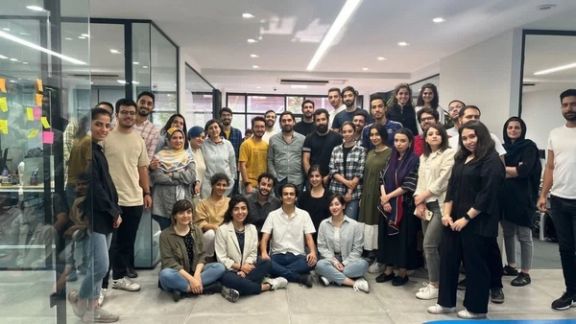
Iran's government has taken action against an insurance company, Azki.com, by suspending its operations due to female employees being photographed without the mandatory hijab.

Iran's government has taken action against an insurance company, Azki.com, by suspending its operations due to female employees being photographed without the mandatory hijab.
Azki.com is an insurance brokerage start-up in Iran that sells insurance contracts from main government insurance companies. The emergence of photos showing some female employees without headscarves drew the ire of hardliner media, demanding the government to close the company for not enforcing the hijab regulations.
In response to the controversy, Azki.com issued a statement on Sunday stating that it was compelled to suspend its operations pending a government investigation. The company clarified that the unauthorized publication of the photos did not reflect its commitment to enforcing the country's laws, including the mandatory hijab.
In recent times, Iran has witnessed an increasing number of women defying hijab rules and appearing in public without headscarves, particularly following anti-regime protests. The regime initially hesitated to react, fearing further public backlash, but it has since revived its 'morality police' patrols on the streets. These patrols stop women without hijab, interrogate them, and impose heavy fines or refer them to courts for potential severe punishments.
Azki.com's suspension comes in the wake of the government's previous action against Digikala, often dubbed as Iran's Amazon, which was shut down on July 24 for similar reasons. The company's female employees were photographed without hijab, leading to demands from hardliners to take strict measures against the retailer and its staff.
Both Azki.com and Digikala are among numerous companies targeted by the regime for allegedly violating hijab rules. As the government continues its crackdown, several businesses have faced closures due to violations related to employees or customers not adhering to the mandatory hijab regulations.

This week, Shiite Ashura ceremonies embraced a marked pro-protest theme, which angered hardliners as their own mourning ceremonies seemed to have waned in popularity.
Complaining that some people mourned the slaying of the revered third Shiite imam Hussein in a way that “pleases the enemy”, a pro-regime cleric said in a sermon in Qom that these mourners have chosen a style to be attractive to foreign media. He was referring to independent Persian broadcasters abroad that give coverage to protests and reflect critical views about regime.
Ashura, commemorated on the 10th of the Islamic lunar month of Muharram, is the anniversary of the death of Prophet Muhammed’s grandson and his 72 companions in the battle of Karbala in 680 AD.
Some of the mourning songs by ordinary people marking the occasion, particularly in the eastern city of Yazd, were ripe with allusions to the protest movement and those who were killed by security forces. Crowds led by maddahs or eulogists also sang verses about poverty and destitution among Iranians who have become poorer in the past five years mainly due to the impact of US sanctions and a failed economic system ripe with corruption.
In an Instagram post Friday, Ehsan Abedi, director general of Yazd Department of Islamic Culture and Guidance, also criticized the critical style of mourning that troubles the regime and its hardliner supporters, and alleged that the “enemy’s media” is cheering.
Over the years, the government has invested money and energy to make Ashura and other religious occasions a show for its support among ordinary people, but this year’s phenomenon of many people trying to take back their religion has received wide coverage on social media.
The online Institute for Iranian Civil Society (Tavaana) reported Friday that agents of the Revolutionary Guards Intelligence Organization (SAS) threatened the organizers of Yazd’s famous mourning ceremonies to stop them from singing songs that criticize the regime, but the congregation sang the “Poppies Growing From the Blood of Motherland’s Youth” while leaving the mosque in protest to their interference.
Social media users have reported that security forces clashed with mourners in the city and arrested some of them.
In several other cities people also paid homage to young people who were killed by security forces during the Mahsa Movement protests in 2022 and early this year.
In Amol in the northern Province of Mazandaran, mourners who were clad in white instead of the traditional black of Shia mourners gathered outside the house of Ghazaleh Ghalabi, 33, who was shot in the head on September 21, soon after protests broke out following Mahsa Amini’s death in the custody of the morality police and visited her grave.
Participants sang the well-known “Poppies Growing From the Blood of Motherland’s Youth”, a revolutionary song from the era of Iran’s Constitutional Revolution (1905-1911). Ghalabi’s mother, Fatemeh Mojtabaei, and some other women defiantly attended the ceremony unveiled.
In Tehran security forces dispersed the mourning youth who were trying to gather outside the house of Hamidreza Rouhi, a university student who was killed by the security forces firing on protesters on November 18, 2022.
In some cities including Tehran in protest to the regime’s brutality, some mourners tied their own hands and feet to flagpoles to commemorate the death of Khodanour Lojei, a young man shot to death on October 1 in Zahedan, capital of southeastern province of Sistan and Baluchestan.
A picture of Lojei with his hands and feet tied to a post with a bottle of water near him, which the thirsty young man could not reach, has turned into one of the icons of the protest movement. The performance alluded to the Shia belief that the Imam’s adversary, Yazid, cut his troops’ access to the waters of Euphrates and killed them after days of thirst in the parched desert.

In a distressing turn of events, renowned Iranian rapper, Saman Seidi (Yasin), has claimed that the regime injected him with an unknown drug in a psychiatric center.
Yasin revealed an ordeal of "unknown drug" injection at Aminabad Psychiatric Center, leading to instability in his mental and physical well-being.
Prison authorities transferred him to the center a week ago, following his arrest during last year's nationwide protests.
Sending a message to Hengaw Human Rights Organization, a Kurdish rights group, from within Rajaeeshahr prison in Karaj, the artist expressed grave concern about his deteriorating condition.
He revealed that on July 22, he was forcibly taken to the psychiatric center, where he was administered the unknown substance with considerable violence and physical assault.
As a result of the injection, Saman Yasin was unconscious for 24 hours, and upon regaining consciousness, found himself restrained to a hospital bed with impaired vision persisting for two days.
"They should take me to the forensic doctor, to see what they did to me," Yasin urged in his statement to Hengaw.
Yasin asserted that he was in "perfect health" prior to his arrest. Holding those responsible for his predicament, he pointedly mentioned notorious Judge Abodlghasem Salavati and other officials.
In a compelling audio message from prison on July 21, Yasin had passionately maintained his innocence, vehemently asserting that he had not committed any crime.
The artist's initial death sentence by the Tehran Revolutionary Court was later challenged, leading to a retrial that the Supreme Court granted. However, the ordeal has persisted, with his fate remaining uncertain.
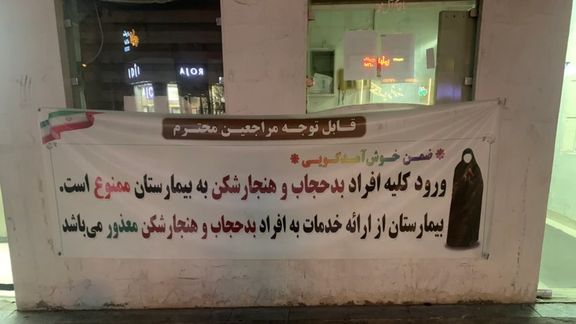
The circulation of a letter to hospitals requiring strict hijab for medical services in northern Iran has sparked strong public reactions.
The letter, signed by Mohammad Taqi Najafzadeh, Director of the health and treatment network in Lahijan city to the heads of local hospitals, has ignited a significant reaction on social media platforms.
In the directive, Najafzadeh unequivocally states that medical centers and health workers must abide by the hijab regulations set forth by the authorities. The letter, however, leaves the crucial question unanswered regarding the medical service protocol in emergency situations, where immediate care may be required irrespective of the patient's observance of hijab.
The publication of this directive has garnered diverse reactions, with notable figures and netizens expressing their concerns. Abbas Abdi, a political activist closely associated with the reformist movement, held both the government and the Ministry of Health accountable for endorsing such a measure. In a tweet, he remarked, "That doctor, being a government administrator, and the ministry, endorsing such an anti-human violation, amid the government's silence, should be held accountable."
Drawing historical analogies, another user likened the directive to the "darkest days of church supremacy" during the Middle Ages when religious decrees were imposed on societal matters.
Critics on Twitter also viewed this directive as a breach of the “medical oath," emphasizing the importance of providing medical services without discrimination or coercion.
Saeed Maliki, a journalist, went a step further and compared the authorities' action to that of ISIS, drawing parallels between the enforcement of hijab observance and the tactics used by the extremist group to force people to abide by its strict interpretation of Sharia law.
It is important to note that this is not the first instance where the issue of observing the hijab has affected medical services in Iran. Following the Women, Life, Freedom protests and the advent of women's movements, reports have emerged of medical centers and hospitals postponing care unless hijab regulations are strictly adhered to.
Earlier this month, an Iranian female medical staff member was subjected to a series of punishments, including performing "cleaning services," for not complying with the mandatory hijab. The US-based Human Rights Activists News Agency (HRANA) reported on July 14 that the judicial authority of the Islamic Republic sentenced her to a ban on employment and cleaning services due to her alleged failure to observe hijab while driving.
Amidst the challenges, a segment of the medical community sought to voice civil protests against these governmental pressures. In March, following an institution's order for compulsory black veiling for women in pharmacies, some pharmacist doctors and male technicians showed their anger by wearing black veils.
The Iranian government employs such punishments with the aim of suppressing opponents of the mandatory hijab. However, reports suggest that these punitive measures have not succeeded in quelling protests, and studies indicate an increase in the emigration of Iranian doctors and nurses in recent months.

As the Iranian parliament reviews the 7th development plan, lawmakers and legal experts say the plan further enables the government to invade people's privacy.
Khabar Online website has quoted Iranian lawyer Omid Salimi-Bani as saying that the text of one ambiguous article shows the government is planning to monitor people's lifestyle to make sure that they adhere to its Islamic standards.
The lawyer said it is up to every individual to be or not be religious. But it seems the government even wants to monitor people's shopping and travel. He likened the plan to the Big Brother in George Orwell's novel 1984. He added that some of what the government is planning to do has been branded as "crime" in the Law Against Computer Crimes.
Salimi-Bani further said that the plan violates several articles of the Iranian Constitutional Law about citizens' privacy.
Meanwhile, Khabar Online also quoted lawmaker Jalal Rashidi Koochaki as saying "Why the government should want to know whether the people are spiritual? What is it good for? Why the government wants to monitor people's lifestyle?"
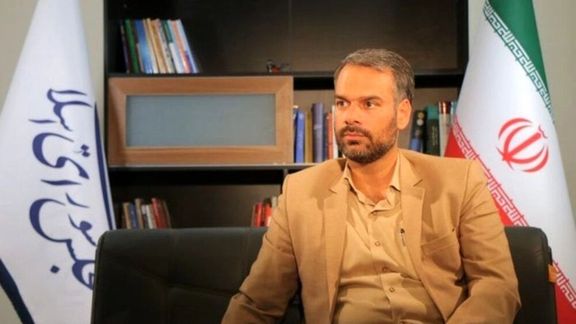
He criticized the plan's security approach where it says that "The Ministry of Culture and Islamic Guidance should continuously monitor cultural aspects of people's life and their lifestyles in order to pave the way for research." Koochaki reiterated that this part of the plan is an elaborate violation of people's privacy.
Another Iranian lawyer, Hamid Reza Aghababaeian told Khabar Online, "No individual or organization is allowed to invade people's privacy with the pretext of collecting information for research." He added that it violates articles 22 to 25 of the Human Rights Charter. He also said that collecting such data without permission from the court and the police and security forces is illegal.
He reminded that, based on the Iranian Penal Code, only judges are allowed to request the monitoring of people's private data.
In another development, Iran's Intelligence Minister Esmail Khatib told reporters that his ministry is considering to intervene several judiciary cases about the people's "mental or psychological security on social media.,” probably referring to a recent trend to label dissidents a threat to people’s mental wellbeing.
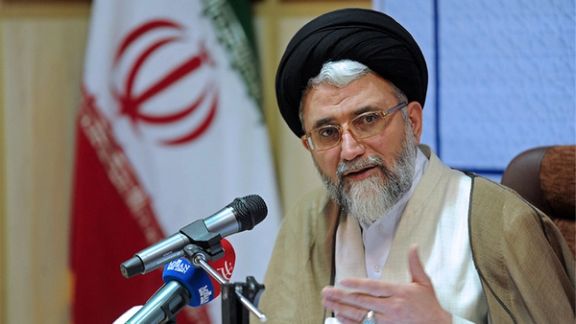
Asked if he did monitor social media, Khatib said: "If I do not monitor social media, then I cannot be the Minister of Intelligence." Responding to the question whether he would allow his children and grandchildren to be active in social media on their smart phones, the minister said: "We have agreed with my children that they should only use Iranian social media platforms."
Iranian social media applications are notorious for collecting and abusing people's private data, both for commercial and government intelligence purposes.
The Islamic Republic has banned all foreign social media applications, because it is afraid of the free flow of information and the likelihood of people organizing opposition using Facebook or Twitter.
Reports this week quoted hardliner commentator Mohammad Sadeq Kooshki as saying that "Instagram has become a venue to recruit terrorists." Kooshki added: "Unfortunately, social media platform including Instagram are not lawful in Iran. Terrorists can contact and recruit people on social media, so, Israeli and European intelligence agents do not need to meet people face to face for recruitment."
The government has banned foreign social media platforms in Iran, however, millions of Iranians use them by circumventing government restrictions by VPN (Virtual Private Networks) also known in Iran as filter breakers.
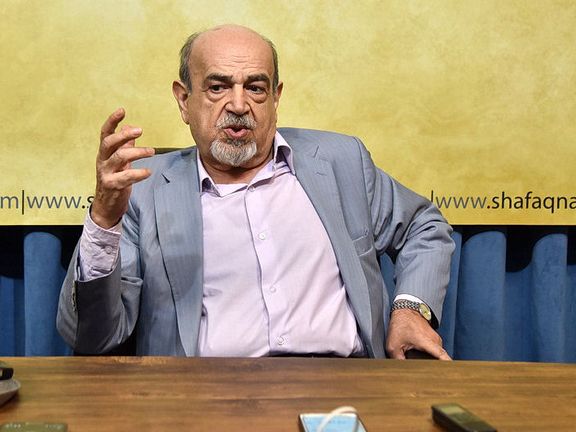
Behrooz Behzadi, the editor-in-chief of Etemad, one of Tehran's prominent reformist dailies, has been barred from media activities by a court in Iran.
After a complaint lodged by IRGC's Thar-Allah headquarters in the capital, and a trial, Behzadi received a six-month prison sentence on grounds of "publishing false content." However, in a subsequent decision, the court opted to amend the sentence to a one-year prohibition from engaging in any form of media responsibility.
The Thar-Allah Headquarters, is a command within the Islamic Revolutionary Guard Corps, responsible for security in the Tehran area. This means it is the principle military force organzing suppression of protests.
The charges against Behzadi primarily stemmed from an interview conducted by Etemad with Dariush Farhood, a revered figure in the field of Iranian genetic science and his alleged abduction by plainclothes agents. Another complaint concerned an article highlighting the arrest of cinematographers and artists who stood in solidarity with the people during nationwide protests.
The court contended that the interview with Farhood presented information that was deemed “false and misleading”.
The case's outcome brings to attention the ongoing challenges faced by media professionals in Iran, where press freedom has been a contentious issue for decades. The 2023 World Press Freedom Index, as compiled by Reporters Without Borders (RSF), ranked Iran at the lowest position on the list, marginally above countries like Vietnam, China, and North Korea, reflecting the gravity of the situation.
Throughout the years, Iran has incarcerated hundreds journalists, writers, and bloggers, often accusing them of jeopardizing national security by expressing their opinions. Tragically, some of these individuals have lost their lives while in detention.